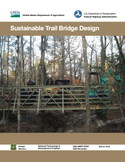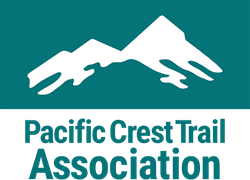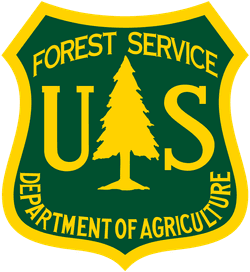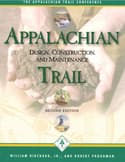
Sustainable Trail Bridge Design
Designing trail bridges based on trail-specific Trail Management Objectives (TMOs) is essential for providing the desired trail experience, for ensuring user safety, and for maximizing bridge longevity.
Understand and apply principles of trail sustainability to all components of a trail construction project
Plan and manage the trail construction site to meet safety and resource protection goals and requirements
Understand and apply common construction specifications/trail management objectives such as corridor height/width, tread width, cross/outslope, protrusions, obstacles, and compaction
Clear the corridor and prepare the site in preparation for construction using proper pruning techniques
Use pruning and brushing techniques to maximize safety, minimize visual impacts and support healthy trailside vegetation
Felling, brushing, bucking and limbing logs of various sizes safely using proper, well-maintained equipment
Materials and debris removal from corridor using low impact techniques, according to project and resource protection requirements
Using hand tools, construct a trail with a full bench, raised tread, and/or combination that meets the construction specifications and minimizes off trail impacts
Safely use and maintain mechanized trail construction equipment (e.g., mini-excavators, skid steers, trail dozers, compactors) to construct trail that meets construction specifications and minimizes off trail impacts
Utilize tools, often mechanical (i.e. excavators, harrow rakes, compact utility loaders, compactors), to meet specifications for final tread surface and backslope preparation and compaction, construction spoils management, and erosion control stabilization
Construct drainage features that decrease erosion and increase sheet flow, including grade reversals, rolling grade dips, berms, ditches, and sheet drains
Develop a water crossing structure (e.g., boardwalk, puncheon, turnpike, bridge, ford) to span drainageways or wetland areas and raise the trail above the high water line while maintaining uninterrupted hydrology beneath the constructed feature
Construct stone or wood retaining walls to bolster unconsolidated soils, gain elevation, or transition tread from rocks/natural barriers
Install the appropriate treadway hardening technique for a trail given the slopes, soils, available material (e.g., wood, rock, gravel) and designed use, including advanced hardening techniques including but not limited to aggregate addition, various types of rock armoring, turnpiking, rock culverts, boulder causeway, rock drains and chemical additives
Demonstrated ability to plan and implement the closure, reclamation, and revegetation of a trail segment
Documents and
Media
• Video Trainings
• Training Programs
• Calendar
Find Trainers •
Find Workers
Learn More

Designing trail bridges based on trail-specific Trail Management Objectives (TMOs) is essential for providing the desired trail experience, for ensuring user safety, and for maximizing bridge longevity.

To help our volunteers succeed in their trail work, PCTA collaborated with many partners to develop a Trail Skills College curriculum.

Discover the lasting satisfaction of working with stone. Master stonemason Charles McRaven covers everything you need to know about working with different types of stone to create a variety of durable and elegant features. Clear enough for the…

The Standard Trail Plans and Specifications reflect current Forest Service trail management efforts and the agency’s Trails Data Dictionary for constructed features and tasks.

Stone Primer is both a practical handbook and an inspirational guide for the budding stonemason.

A handbook on trail work, from landscape values to the nitty-gritty of moving rock.
Trail Skills Training Library

Learn about the creation of the Trail Technician Level 1 certification and their curriculum—now a national benchmark for workforce development.

The webinar will address the difference between Wheelchair and OPDMD (Other Power Drive Mobility Devices), explain the ADAs Assessment Factors, clarify Legitimate Safety Requirements, how to develop Policy and the importance of Training.

With the increasing public demand for native plants and a push to find alternatives, learn from one landscape architect’s experience developing prairies in a variety of environments.

This webinar aims to introduce you to the fundamentals of managing a sustainable horse farm. This is part two of a two-part series related to sustainability.

This session will include a general introduction to various types of trail surfacing, this webinar will focus on design and construction factors specific to aggregate surfaced trails.

This session will provide applicable knowledge of soil including soil description, grain size distribution and its measurement, clay plasticity, and compaction curves and the importance of water.
Further Education

The Trail Technician multiple-choice exam evaluates foundational knowledge in trail development, aligned with the progression from entry-level to full Trail Competency standards.

The Professional TrailBuilders Association (PTBA) has launched the development of the Trail Fundamentals Video Series—a free, entry-level educational resource designed to support sustainable trail development and trail trainings worldwide.

This school is typically two days in length with IMBA instructor(s) traveling to your location to deliver the class to staff or members. Instructors arrive the day before to assess the site and do any necessary preparations. Organizations, clubs, or…

Trail Care Schools equip volunteers and organizations with the skills necessary to maintain modern mountain bike trails in partnership with the local land management. This course will begin with sustainable trail design principles, such as drainage…

In this one-year certificate program, you’ll have boots-on-the-ground at Northwoods Stewardship Center in East Charleston, VT for three individual week-long intensive classes. You will grow your knowledge base and connect with trail building…
Trail Academy is our free class series that teaches students how to tackle any trail-related challenge. Courses are hosted both in the field and online, and are a great starting point for anyone looking to become a certified Trail Crew Leader or…
Skill Library
Training Calendar
September 08 - May 08, 2026
Hot Springs National Park, Arkansas
Custom Trainings